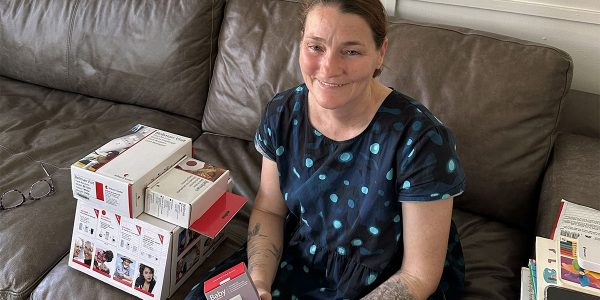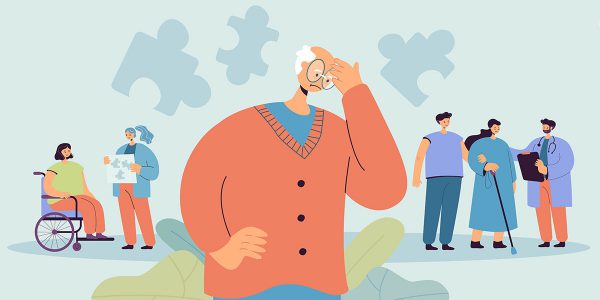What is Tinnitus? Causes and Treatment.

Updated: January 2024 with a new section – Potential Promising Treatments for Tinnitus
According to Health Direct, about two-thirds of people in Australia suffer from tinnitus at some stage of their life. About 10-20% have tinnitus that severely affects their quality of life.
Tinnitus Australia states that about 500,000 people in Australia find their tinnitus very distressing. They also note that 45% of tinnitus sufferers experience anxiety and 33% report major depression due to their tinnitus.
So, while many of us may ignore the odd noises we hear every now and again, tinnitus has a considerable impact on a large proportion of the population.
This is why tinnitus awareness is so important. In this article, we’ll run through the basics, covering what tinnitus is, what causes it, what impact it has on people and how best to treat it.
What is tinnitus?
Tinnitus is the medical term for the perception of sound even when no external sound stimulus exists. It is often referred to as “ringing in the ears”.
It’s important to note that tinnitus is an actual physical symptom of underlying causes. It is not something imagined by the sufferer. This realisation is important because it can often be difficult to empathise with people experiencing tinnitus when we can’t directly experience it ourselves. We need to understand that the sound the person hears is very real and is generated within their auditory system. It is generally accepted that tinnitus is brain activity that has got out of normal balance.
The sounds people can hear can be soft or loud, pulsing, intermittent or steady. While we often call tinnitus “ringing in the ears”, there are many different ways people perceive tinnitus. Some people have described their tinnitus as either roaring, whooshing, buzzing, clicking, ringing, humming, hissing or whistling noises. Loudness can vary from a soft, background cricket-like effect to, in some acute cases, a freight train constantly roaring past. For some, this perceived sound can be so loud it interferes with their ability to focus or clearly hear external sounds.
Everyone will experience tinnitus differently. Some may not even notice it on a day-to-day basis, while for others, tinnitus can make their daily life almost unbearable. The following video produced by The British Tinnitus Association shows real-world examples of what tinnitus sounds like to different people.
What causes tinnitus?
We do not know the exact answer to what causes tinnitus.
We know that tinnitus can be caused or aggravated by several conditions and factors. But for some patients, the cause may not be evident.
There are three main types of tinnitus:
- Subjective Tinnitus
- Objective Tinnitus
- Pulsatile Tinnitus
The cause for each type differs.
Subjective Tinnitus
The most common form of tinnitus, subjective tinnitus, is where only the patient can hear the sound.
Subjective tinnitus can be caused or aggravated for many different reasons, including:
- Hearing loss – e.g., ear infections, excessive ear wax, age-related or through noise-induced hearing loss (NILS)
- Meniere’s disease – a rare disorder of the inner ear that causes dizziness, vertigo and balance problems
- Acoustic neuromas – noncancerous, usually slow-growing tumours
- Ototoxic medications or substances – medications that can cause hearing or balance issues, including nonsteroidal anti-inflammatory drugs (NSAIDs), certain antibiotics, cancer drugs, water pills (diuretics), antimalarial drugs, and antidepressants
- Multiple sclerosis
- Head injuries
- Thyroid disorder
- Hyperlipidemia
- Vitamin B12 deficiency
- Depression
- Anxiety
- Fibromyalgia
- and more
Objective Tinnitus
Objective tinnitus is an uncommon form of tinnitus. Objective tinnitus is head or ear noises that are audible to other people. These sounds are usually produced by internal functions in the body’s blood flow and musculoskeletal movement systems.
Pulsatile Tinnitus
Pulsatile tinnitus is a rare form of tinnitus. In pulsatile tinnitus, the sound is a rhythmic pulsing noise caused by a person’s circulatory system.
What are the symptoms and impacts of tinnitus?
Some people aren’t bothered by their tinnitus. For others, it only becomes noticeable in a quiet environment or at night when they try to sleep.
For others, tinnitus can be a debilitating illness. It can impact their health and interfere with their ability to work or socialise. The American Tinnitus Association (ATA) highlights a range of impacts tinnitus can have on the sufferer, including:
- Distress
- Depression
- Anxiety
- Frequent mood swings
- Sleep disturbances
- Irritability or frustration
- Poor concentration
- Pain (particularly when tinnitus is accompanied by hyperacusis)
It’s not a small percentage deeply affected by this either. The ATA asked members to indicate how much tinnitus impacted their daily lives, and 20% of the 1,100+ respondents ranked it 8 or above (on a 1-10 scale).
When asked how it affected them, only 4% said they barely noticed it, and 34% said it was annoying but didn’t significantly impact their life. The rest all reported impacts like sleep problems, trouble concentrating, anxiety, social isolation, depression and more. 1 in 50 said they were unable to work.
How can I treat my tinnitus?
Personal and medical intervention focuses on managing tinnitus and lessening its impact on the patient.
Some of the ways to lessen the impact of tinnitus include:
- Treating any actual hearing loss present.
- Counselling and therapy – understanding tinnitus and how it might impact you go a long way in dealing with any effects tinnitus has on you.
- Relaxation and meditation apps and techniques – stress and anxiety can increase the perception of tinnitus in some people. Finding ways to relax can help reduce the impact of tinnitus.
- Sound masking apps or generating background noise – other sounds in the background, like a fan whirring or the radio softly playing. This all helps the brain take the focus off the tinnitus.
- Diet changes – for some people, a change in diet, including caffeine intake such as coffee, tea, or cola, has shown improvement in their tinnitus symptoms.
- Avoid overly noisy environments – continued exposure to high noise levels can aggravate or worsen your tinnitus.
You should also talk to your GP about any medications you are taking that could worsen your tinnitus.
Potential Treatment for Tinnitus
While past treatments have primarily focused on reducing the impact of tinnitus on the sufferer, a new medical treatment is receiving increasing attention as it starts to show serious promise in treating one of the most prevalent hearing conditions.
Bimodal Neuromodulation
The Washington Post reported on 19 January 2024 that a new treatment is reducing symptoms in many patients. The treatment, known as bimodal neuromodulation, involves using two different types of stimuli to modulate neural activity in the brain. In the context of treating tinnitus, bimodal neuromodulation typically combines auditory stimulation with another form of sensory stimulation.
Treatment devices use bimodal neuromodulation techniques for treating tinnitus by delivering auditory stimulation along with either tongue or facial nerve stimulation or stimulating the wrist in addition to providing auditory input.
The idea behind bimodal neuromodulation is to influence the neural circuits associated with tinnitus in multiple ways. By targeting different sensory modalities simultaneously, it is believed that the brain’s response to the perceived sound (tinnitus) can be modified or regulated.
The combination of auditory and non-auditory stimuli aims to induce neural plasticity, potentially reducing the severity of tinnitus symptoms.
Bimodal neuromodulation has been on the radar for a few years now with promises of helping people address their tinnitus. In 2022, Nature Journal reported on this approach and relayed that participants showed statistically significant reductions in tinnitus symptoms.
In early 2023, the first bimodal neuromodulation device for tinnitus received FDA approval.
And now, a little under a year later, we see reports that there appears to be consistency in the relief of symptoms, which is very promising indeed.
However, it’s important to note that while some studies have shown promising results in reducing tinnitus severity with bimodal neuromodulation, more research is needed to understand its effectiveness fully, and the underlying mechanisms are still a subject of scientific investigation.
When should you seek help for your tinnitus?
The moment you notice you have tinnitus, you should seek professional help. The sooner you recognise your tinnitus, the sooner you can start learning the management strategies and other actions you can take – including minimising your exposure to additional loud noise.
Once you have recognised your tinnitus, an audiologist can help document its severity using a tinnitus handicap questionnaire. This will also help you document your tinnitus and its progression over time or how different things may impact its severity.
Where can you seek help for tinnitus?
Your first port of call should be your GP. If your tinnitus is causing you concern or has gotten noticeably worse, make an appointment to see your GP and be sure to discuss referral to an audiologist. Some audiologists may recommend you see other specialists, particularly if your symptoms are becoming difficult to manage.
Tinnitus can have a profound impact on people and can be experienced in different ways, often resulting in depression, anxiety and feelings of isolation. If you or someone you know is finding it difficult to cope with tinnitus, do not hesitate to call one of the many support services available including Lifeline and Beyond Blue. (Links at the end of this article)
BHA provides a free information and referral service, so if you’re not sure, you can contact us, and we’ll make sure you get the help you need. You might also consider joining one of our peer support groups. Talking to others who may be going through a similar experience is a great way to get some extra help and advice – you might even make a friend at the same time. If there is no peer support group near you, we can help you establish one, and you can help others on their journey too.
As always, the best way to deal with any hearing issue, whether hearing loss or tinnitus, is to seek professional help as early as possible.
Tinnitus Resources
Tinnitus First Aid Kit
The Tinnitus First Aid Kit, developed with the British Tinnitus Association, is a website full of useful advice and information for people newly diagnosed with tinnitus.
Tinnitus Thermometer
The Tinnitus Thermometer is a PDF or online questionnaire that you can use to assess how your clients are experiencing tinnitus at a given moment – and over time.
Tinnitus Communication Guide
The Tinnitus Communication Guide suggests some useful questions and communication tips to help you understand your client, express empathy, and give hope.
Tinnitus Management Course
Ida Institute’s online Tinnitus Management course for audiologists and audiometrists includes guidance on using its tinnitus tools.
Feature image by Elyas Pasban on Unsplash





